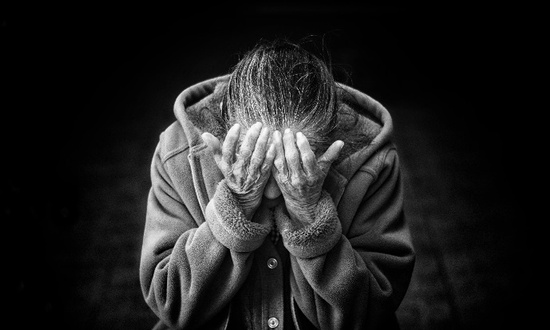Las encuestas indican que por cada norteamericano que cree que va a ir al infierno, hay 120 que creen que van a ir al Cielo.1 Este optimismo se destaca en contraste total a las palabras de Cristo en Mateo 7:13-14: “Entren por la puerta estrecha. Porque es ancha la puerta y espacioso el camino que conduce a la destrucción, y muchos entran por ella. Pero estrecha es la puerta y angosto el camino que conduce a la vida, y son pocos los que la encuentran”.
Así que el Cielo no es nuestro destino automático. Nadie va a allí automáticamente. A menos que nuestro problema del pecado sea resuelto, hay un solo lugar al que iremos como nuestro destino automático . . . el infierno.
En la Biblia, Jesús dice más que nadie sobre el infierno (Mateo 10:28; 13:40-42; Marcos 9:43-44). Se refiere al infierno como un lugar y lo describe en términos gráficos, incluyendo fuegos ardientes y el gusano que no muere. Cristo dice que “a los súbditos del reino se les echará afuera, a la oscuridad, donde habrá llanto y rechinar de dientes” (Mateo 8:12).
¿Es posible saber de cierto que iremos al Cielo? El apóstol Juan dijo: “Les escribo estas cosas a ustedes que creen en el nombre del Hijo de Dios, para que sepan que tienen vida eterna” (1 Juan 5:13, incluido el énfasis). Podemos saber con seguridad que iremos al cielo cuando muramos.
¿Tiene usted esa seguridad? Si no la tiene, por favor lea cuidadosamente las últimas páginas de este folleto. Puede ser lo más importante que leerá jamás. (¿Qué podría ser más importante para usted que considerar si irá al Cielo o al infierno?)
Pecar es estar destituidos de las normas santas de Dios. El pecado fue lo que hizo que se terminara el paraíso del Edén. Y todos nosotros, al igual que Adán y Eva, somos pecadores. Usted es pecador. “Todos han pecado y están privados de la Gloria de Dios” (Romanos 3:23). El pecado nos separa de una relación con Dios (Isaías 59:2). Hay una gran brecha entre nosotros y Dios y nada hay que podamos hacer para atravesarla. El pecado nos engaña y nos hace pensar que lo malo es bueno y que lo bueno es malo (Proverbios 14:12). Nos hace imaginar que estamos bien cuando no lo estamos.
El pecado tiene consecuencias, pero Dios ha provisto una solución para nuestro pecado: “Porque la paga del pecado es muerte, mientras que la dádiva de Dios es vida eterna en Cristo Jesús, Señor nuestro” (Romanos 6:23). Jesucristo, el Hijo de Dios, nos amó tanto que se hizo hombre para librarnos de nuestros pecados (Juan 3:16). Él vino para identificarse con nosotros en nuestra humanidad y nuestra debilidad, pero lo hizo sin ser manchado por nuestro pecado, nuestro engaño de nosotros mismos, y nuestras fallas morales (Hebreos 2:17-18; 4:15-16).
Cristo murió en la cruz como el único justo que podía pagar la penalidad por nuestros pecados que demandaba la santidad de Dios (2 Corintios 5:21). En la cruz Él asumió el infierno que merecemos para ganar para nosotros el Cielo que no merecemos.
Jesucristo se levantó de la tumba venciendo al pecado y conquistando la muerte (1 Corintios 15:3-4, 54-57).
Cuando Cristo murió en la cruz por nosotros, dijo: “Consumado es” (Juan 19:30, Reina Valera, revisión 1960). La palabra griega que se tradujo “consumado” se escribía comúnmente sobre los certificados de deuda cuando eran cancelados. Quería decir “pagado por completo”. Cristo murió para que el certificado de deuda, que consiste de todos nuestros pecados, pudiera ser marcado de una vez por todas, “pagado por completo”.
Sólo cuando Cristo se hace cargo de nuestros pecados podemos entrar al Cielo. No podemos pagar nuestra propia entrada. Jesús dijo: “Nadie llega al Padre sino por mí” (Juan 14:6). “En ningún otro hay salvación [sino Jesús], porque no hay bajo el cielo otro nombre dado a los hombres mediante el cual podamos ser salvos” (Hechos 4:12).
La muerte de Cristo en la cruz, y su resurrección, es el puente que cruza el abismo que nos separa de Dios. Debido a la expiación de nuestros pecados por Cristo, Dios nos ofrece libremente el perdón: “No nos trata conforme a nuestros pecados ni nos paga según nuestras maldades. Tan grande es su amor por los que le temen como alto es el cielo sobre la tierra. Tan lejos de nosotros echó nuestras transgresiones como lejos del oriente está el occidente” (Salmo 103:10-12).
Para ser perdonados debemos reconocer y arrepentirnos de nuestros pecados. “Si confesamos nuestros pecados, Dios, que es fiel y justo, nos los perdonará y nos limpiará de toda maldad” (1 Juan 1:9).
Cristo les ofrece a todas las personas el don del perdón, la salvación y la vida eterna: “El que tenga sed, venga; y el que quiera, tome gratuitamente del agua de la vida” (Apocalipsis 22:17).
No hay ninguna obra de justicia que nosotros podamos hacer que nos obtenga un lugar en el Cielo (Tito 3:5). Venimos a Cristo con las manos vacías. No podemos tomar ningún reconocimiento por la salvación: “Porque por gracia ustedes han sido salvados mediante la fe; esto no procede de ustedes, sino que es el regalo de Dios, no por obras, para que nadie se jacte” (Efesios 2:8-9). Este regalo no puede ser ganado o logrado. No depende de nuestro méritoo esfuerzos, sino solamente en el generoso sacrificio de Cristo por nosotros.
Ahora es el momento para arreglar las cosas con Dios. Confiese sus pecados y acepte el sacrificio que Jesucristo hizo en su nombre.
Usted ha sido creado para una persona y un lugar. Jesús es la persona y el Cielo es el lugar. Los dos forman un paquete—vienen juntos. No puede llegar al Cielo sin Jesús, o a Jesús sin el Cielo.
“Busquen al Señor mientras se deje encontrar, llámenlo mientras esté cercano” (Isaías 55:6). Si usted acude a Cristo para que lo salve, tendrá toda la eternidad, en el Nuevo Cielo y en la Nueva Tierra, para estar gozoso de que lo hizo.
¡Y yo estaré deseando verle a usted allí!
Extracto de El Cielo: Respuestas biblicas a sus preguntas by Randy Alcorn.
Notas
1 K. Connie Kang, “Next Stop, the Pearly Gates . . . or Hell?” [“Próxima Parada, ¿las Puertas de Perlas . . . o el Infierno?”] Los Angeles Times (Octubre 24, 2003).
How Can We Know for Sure That We’ll Go to Heaven?
(Excerpt from the Heaven booklet)
A Barna poll shows that for every American who believes he or she is going to Hell, there are 120 who believe they’re going to Heaven.2 Yet Christ said otherwise: “Enter through the narrow gate. For wide is the gate and broad is the road that leads to destruction, and many enter through it. But small is the gate and narrow the road that leads to life, and only a few find it” (Matthew7:13-14).
Heaven, then, is not our default destination. No one goes there automatically. Unless our sin problem is dealt with, the only place we can go is Hell, our true default destination when we die.
In the Bible, Jesus talks more about Hell than anyone else (Matthew10:28;13:40-42; Mark9:43-44). He refers to it as a real place and describes it in graphic terms—including raging fires and the worm that doesn’t die. Christ says the unsaved “will be thrown outside, into the darkness, where there will be weeping and gnashing of teeth” (Matthew8:12).
Is it possible to know for sure we’re going to Heaven? The apostle John said, “I write these things to you who believe in the name of the Son of God so that you may know that you have eternal life” (1 John 5:13). So we can know for sure that we’ll go to Heaven when we die.
Do you? If not, please read carefully the last few pages of this booklet. It may be the most important thing you ever read. (What could be more important for you to consider than whether you go to Heaven or to Hell?)
To sin means to fall short of God’s holy standards. Sin is what endedEden’s paradise. And all of us, like Adam and Eve, are sinners. You too are a sinner. “All have sinned and fall short of the glory of God” (Romans3:23). Sin separates us from a relationship with God (Isaiah 59:2). There’s a huge gulf between us and God, and there’s nothing we can do to cross it. Sin deceives us and makes us think that wrong is right and right is wrong (Proverbs14:12). It makes us imagine that we’re okay when we’re really not.
Sin has terrible consequences, but God has provided a solution: “The wages of sin is death, but the gift of God is eternal life in Christ Jesus our Lord” (Romans6:23). Jesus Christ, the Son of God, loved us so much that he became a man to deliver us from our sin (John 3:16). He came to identify with us in our humanity and our weakness, but he did so without being tainted by our sin (Hebrews2:17-18;4:15-16).
Jesus died on the cross as the only one worthy to pay the penalty for our sins demanded by the holiness of God (2 Corinthians5:21). On the cross, he took upon himself the Hell we deserve, in order to purchase for us the Heaven we don’t deserve.
Being God, and therefore all-powerful, Jesus Christ rose from the grave, defeating sin and conquering death (1 Corinthians 15:3-4, 54-57).
When Christ died on the cross for us, he said, “It is finished” (John19:30). The Greek word translated “it is finished” was commonly written across certificates of debt when they were canceled. It meant “paid in full.” Christ died so that the certificate of debt, consisting of all our sins, could once and for all be marked “paid in full.”
Only when our sins are dealt with in Christ can we enter Heaven. We cannot pay our own way. Jesus said, “No one comes to the Father except through me” (John 14:6). “Salvation is found in no one else [but Jesus], for there is no other name under heaven given to men by which we must be saved” (Acts4:12).
Christ’s death on the cross, and his resurrection, is the bridge that crosses that chasm which separates us from God. Because of Jesus Christ’s atonement for our sins, God freely offers us forgiveness: “He does not treat us as our sins deserve or repay us according to our iniquities. For as high as the heavens are above the earth, so great is his love for those who fear him; as far as the east is from the west, so far has he removed our transgressions from us” (Psalm 103:10-12).
To be forgiven, we must recognize and repent of our sins: “He who conceals his sins does not prosper, but whoever confesses and renounces them finds mercy” (Proverbs 28:13). Forgiveness is not automatic. It’s conditioned upon confession: “If we confess our sins, he is faithful and just and will forgive us our sins and purify us from all unrighteousness” (1 John 1:9).
Christ offers to everyone the gift of forgiveness, salvation, and eternal life: “Whoever is thirsty, let him come; and whoever wishes, let him take the free gift of the water of life” (Revelation22:17).
There’s no righteous deed we can do that will earn us a place in Heaven (Titus 3:5). We come to Christ empty-handed. We can take no credit for salvation: “For it is by grace you have been saved, through faith—and this not from yourselves, it is the gift of God—not by works, so that no one can boast” (Ephesians 2:8-9). This gift cannot be worked for, earned, or achieved. It’s not dependent on our merit or effort but solely on Christ’s generous sacrifice on our behalf.
Now is the time to make things right with God. Confess your sinfulness and accept the sacrifice of Jesus Christ on your behalf.
You are made for a person and a place. Jesus is the person, and Heaven is the place. They are a package—they come together. You cannot get Heaven without Jesus, or Jesus without Heaven.
“Seek the Lord while he may be found; call on him while he is near” (Isaiah 55:6). If you do call upon Christ to save you, you’ll have all eternity, in the New Heaven and on the New Earth, to be glad that you did.
And I’ll look forward to seeing you there!
Excerpt from Heaven: Biblical Answers to Common Questions by Randy Alcorn.
Notes
2 K. Connie Kang, “Next Stop, the Pearly Gates . . . or Hell?” Los Angeles Times (October 24, 2003).
Photo by Luis Quintero on Unsplash




